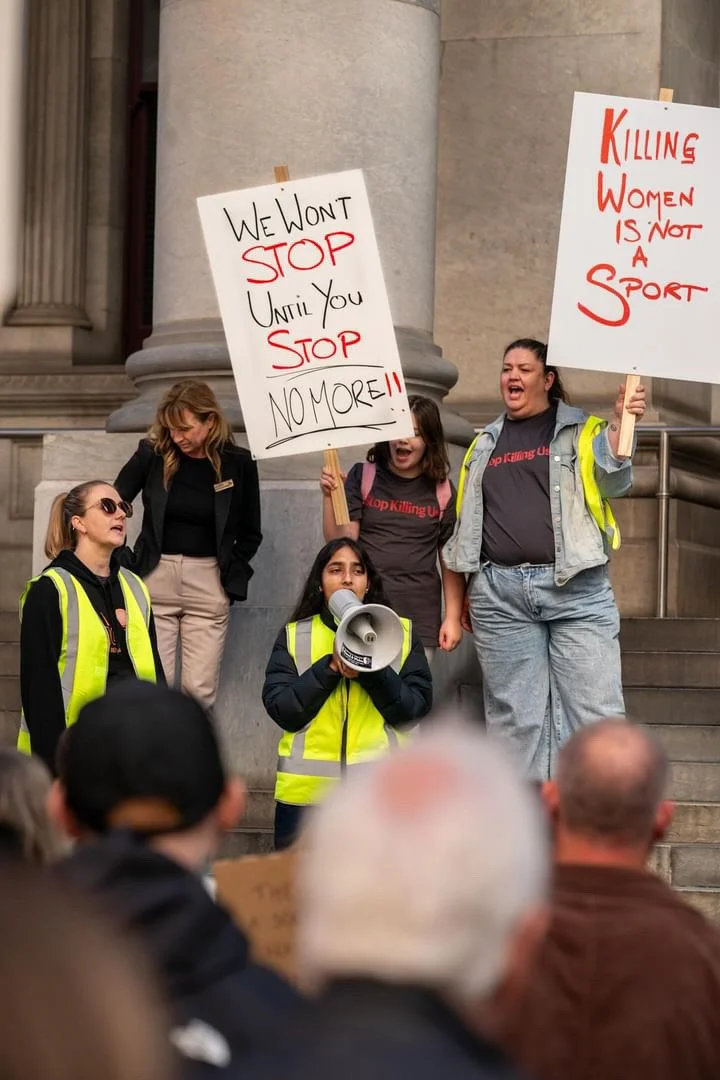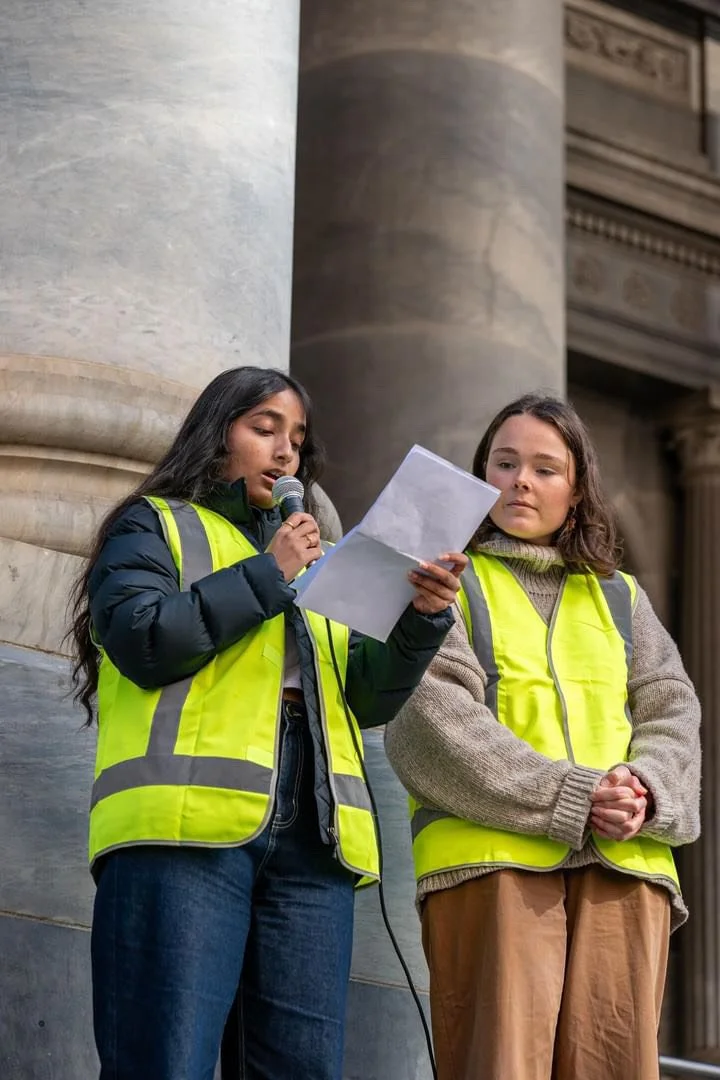Sania Ali
Making positive change with Sania Ali
Zane LeBlond: So, Sania, tell me a bit about yourself?
Sania Ali: Hi! So, I’m Sania, and I’m a 16-year-old and have been lucky to be involved in the youth changemaking space. I’m grateful to say that I’m on a few state and national youth advisory boards and groups, as well as a part of a couple state and national campaigns, among other activities. The work that I’m very lucky to be involved in stems from my passion about advocating for issues that affect young people, women, and other marginalised communities. Because of this, the main issues that I currently focus on in my work including lowering the voting age, advocating for menstrual poverty, and rallying support for those affected by domestic violence. In my free time, I love to bake and am very interested in fashion.
ZL: What inspirations or events led you to become an advocate for others around you?
SA: I was in year 7 when I first heard of the word ‘activism’. This was through the international headlines I heard about the various movements that reignited in 2020, which had countless social media campaigns and posts. This led me to become interested in social and international issues and motivated me to further educate myself. Coming from a diverse background, I had a lot of experiences that were unpleasant like facing racism and discreet sexism even at the young age of 13.
As I matured at that age with newfound knowledge, I felt motivated to speak up, and do something. I started noticing issues around me, in my neighbourhood, at school, even at my local cultural gatherings. Like: why is the street so unsafe at night? Why do the men get to eat first at every gathering when the women always cooked?
Eventually, my mum noticed how outspoken I had become and pushed me to do debate and public speaking as I was still quite a shy teen. At only 13, my mum encouraged me and gave me ideas of maybe becoming a lawyer, like an international human rights lawyer of sorts because I was clearly so passionate about bringing change and lectured everyone around me. I was a very, very ambitious 13-year-old, and I’m still extremely ambitious, partly thanks to my mum who instilled ambition and goals in me from a young age.
This can seem silly to others, but since then, I knew exactly what I was going to do, and who I was going to become. I’ve grown immensely since then and still push myself further every day to achieve my ambitions and become a greater advocate for others.
ZL: Young people across Australia want the voting age reduced to 16 years of age. This has spawned the campaign Make It 16 – could you tell us a bit about it?
SA: The Make It 16 campaign is, as understood by its name, a campaign to extend the right of voting to 16- and 17-year-olds across the country. It was started by co-founders Archie Coppola and Tabitha Stephenson-Jones in 2023 right here in SA. The campaign has done two camps with its new members, and I was lucky enough to be a part of the second camp this year in Canberra. Make It 16’s has its successes, with many articles, meetings with stakeholders, and launching petitions to the ACT legislative assembly.
It’s been great to see bills introduced at different levels of government around the country to lower the voting age – clearly, it’s something people around Australia want. Make It 16’s collective goals of inclusion, accurate representation of young people and our participation in our democracy made me join the cause.
The incredible times I’ve spent with this campaign, life-long friends that I’ve made, the endless opportunities I’ve been lucky to receive such as co-authoring an article for Crikey, and most importantly, the change I’ve helped create have made this one of the best experiences of my life. I highly recommend joining the campaign as a volunteer for anyone who believes in the cause, and those who want to create change for the future generations.
ZL: How did you get involved with Make It 16?
SA: I found out about the campaign through social media and decided to try my luck and apply for its base building camp in Canberra. The application was simple, with a few questions asking for why I wanted to join the campaign, and general information.
ZL: You’re also a member of SA SRC, a cool opportunity for young people to have a say in policy decisions that affect them, lead campaigns and much more. How? Would you describe the program’s significance to you?
SA: The SA SRC campaign is truly, an amazing experience for me so far. We began the program at the SA SRC Summit back in March where we got to meet all the participants, the Commissioner, and some politicians with whom we had roundtable discussions within regard to our campaigns. As a part of the lowering the voting age campaign, I have so far been a part of the surveys we have done, and I’ve most enjoyed is the national hearings with the standing committee on civic education, which I got to participate in.
This national hearing was with a few other amazing peers from the campaign, and we all joined the Commissioner in a conversation with senators on the issue of civic education with points being raised by us such as the lack of comprehensive civic education in primary school and the importance of teaching younger generations about the power of voting. The topic, along with the new and exciting experience of such an opportunity, made it such a memorable memory and experience for me. In the future, I hope I can have more such opportunities where I can bring people’s voices to places of importance.
Sania Ali outside the Parliament of South Australia protesting against domestic violence.
ZL: As a young changemaker from South Australia, what advice do you have for others who want to make change, become a community advocate, or just be involved?
SA: I think when it comes to becoming an advocate, the aim and motivation should come from the heart. The reason I started what I did, is because of the struggles and issues I started noticing around me and feeling the genuine urge for change. A lot of the issues I saw were personal as well and I saw how they were actively affecting those around me. And to me, being an advocate is also being a leader, and someone close to me once told me that to be a good leader, you need to know your why.
Why do you want to make change? Why is this change important? Why do you have to be the one to create change? Whenever you figure out your why, your progress and goals will come much faster. And being a leader, an advocate, and a changemaker all needs to start with those around you. With your community, with your neighbourhood. One can feel all the ambition to change the world, but changing the world still starts with your home, and your town. So, I would just say to find your motivation and your passion, and the opportunity will follow.
ZL: In your experience so far, do you think politicians are listening to young people?
SA: Through my experiences so far as a young person, I think this current era of politicians are doing far better to listen to youth’s opinions. Personally, I had noticed a surge of opportunity for young people in civics around a couple years ago. With so many more youth advisory boards, groups, and with national work like the Office for Youth’s Engage, run by the Minister, Anne Aly. I genuinely think there is a lot more relevancy on the opinion of young people for current politicians, however, I still feel that some organisations and groups still need to do significantly better in their inclusion of young people especially those in remote/regional areas due to the lack of accessibility a lot of opportunities still have. And regarding the climate, there’s a lot of significant improvements that need to be made for young people to effectively voice their opinion, and, for the implementation or use of our opinions. Countless youth advisory boards and other forms of opportunity can be made, but there will be no use if our input isn’t considered. But in general, yes, I think politicians are listening to our young voices, and I hope to see our inclusion grow further.
ZL: Finally, if you had unlimited resources to make any change possible, what would it be?
SA: If I had access to such resources, I would dedicate all my efforts to ensure true equality and equity for women, especially those from diverse and marginalised backgrounds who do not receive the same type and amount of opportunity and chances. I would aim to dismantle systemic barriers in the workforce. And, I would establish extensive and accessible leadership opportunities, ensuring women from diverse backgrounds and marginalised communities can seize these opportunities.
I believe that we must eradicate gender-based violence. And with infinite resources, I’d build extensive prevention programs, support services for survivors, and enforce laws to ensure safety and justice for all women considering those with lived experiences. In a hypothetical world with infinite resources, I would seize the opportunity to do all of this as I know, in this very much real world, how imperative a truly equitable society is needed. A world in which every woman thrives. But until I can access these infinite resources, I will dedicate my efforts, knowledge, skills, and time to step closer, and closer to this much needed change.


